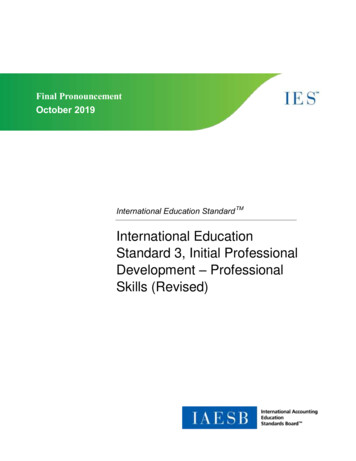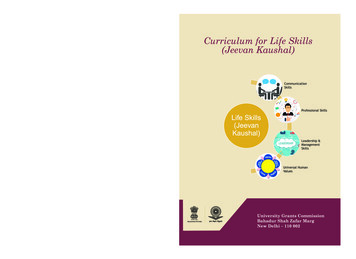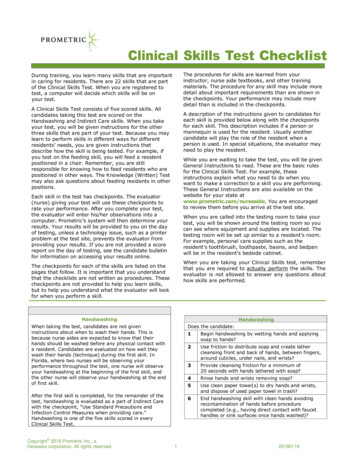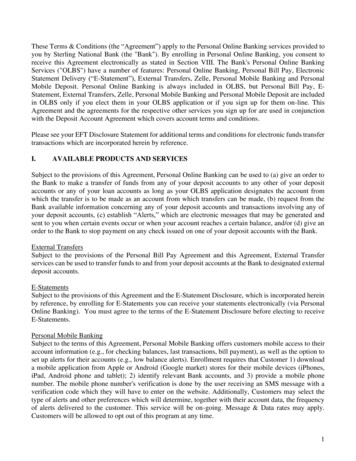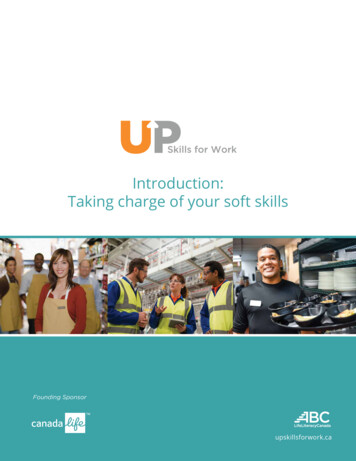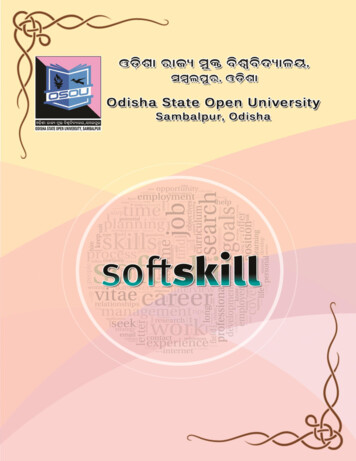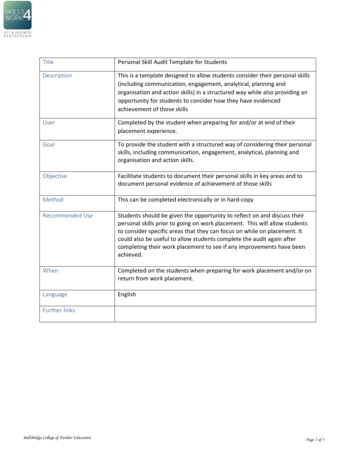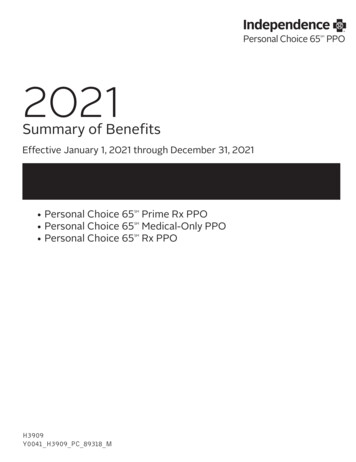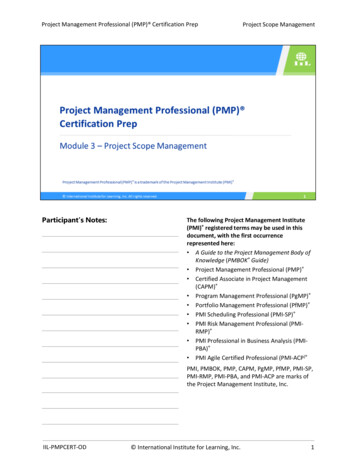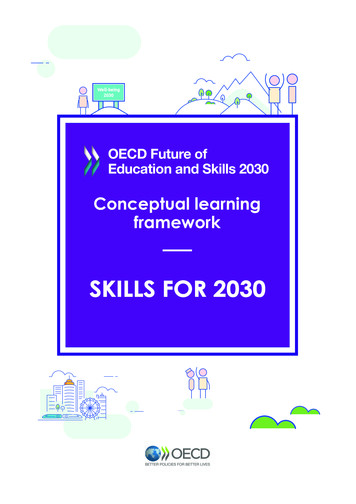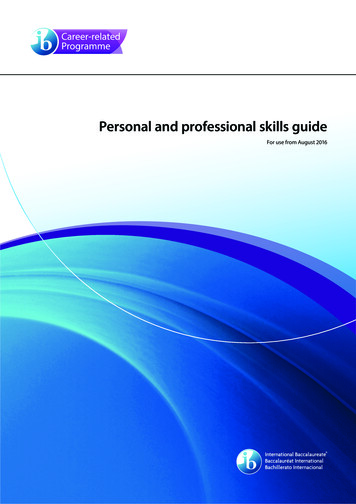
Transcription
Personal and professional skills guideFor use from August 2016
Personal and professional skills guideFor use from August 2016
Career-related ProgrammePersonal and professional skills guidePublished December 2015Published byInternational Baccalaureate Organization15 Route des Morillons1218 Le Grand-SaconnexGeneva, SwitzerlandRepresented byIB Publishing Ltd, Churchillplein 6, The Hague, 2517JW The Netherlands International Baccalaureate Organization 2015The International Baccalaureate Organization (known as the IB) offers four high-qualityand challenging educational programmes for a worldwide community of schools, aimingto create a better, more peaceful world. This publication is one of a range of materialsproduced to support these programmes.The IB may use a variety of sources in its work and checks information to verify accuracyand authenticity, particularly when using community-based knowledge sources such asWikipedia. The IB respects the principles of intellectual property and makes strenuousefforts to identify and obtain permission before publication from rights holders of allcopyright material used. The IB is grateful for permissions received for material usedin this publication and will be pleased to correct any errors or omissions at the earliestopportunity.All rights reserved. No part of this publication may be reproduced, stored in a retrievalsystem, or transmitted, in any form or by any means, without the prior written permissionof the IB, or as expressly permitted by law or by the IB’s own rules and policy. Seewww.ibo.org/copyright.IB merchandise and publications can be purchased through the IB store atstore.ibo.org.Email: sales@ibo.orgInternational Baccalaureate, Baccalauréat International and Bachillerato Internacionalare registered trademarks of the International Baccalaureate Organization.
IB mission statementThe International Baccalaureate aims to develop inquiring, knowledgeable and caring young people whohelp to create a better and more peaceful world through intercultural understanding and respect.To this end the organization works with schools, governments and international organizations to developchallenging programmes of international education and rigorous assessment.These programmes encourage students across the world to become active, compassionate and lifelonglearners who understand that other people, with their differences, can also be right.
ContentsIntroduction1About this guide1Principles of the Career-related Programme core2Aims of the Career-related Programme core3Ethical education4Approaches to teaching and approaches to learning5Academic honesty6Assessment in the Career-related Programme7Personal and professional skills8Nature of personal and professional skills8Overview of personal and professional skills10Personal and professional skills course design12The five themes13Outline of topics and subtopics15The five themes in detail17Course review60Course review60Programme evaluation61Programme evaluation61Learning diversity62Learning diversity62Personal and professional skills guide
IntroductionAbout this guidePurposeThis guide is intended to support the planning and organization of personal and professional skills, oneof the core components of the IB Career-related Programme (CP). It is written primarily for the teacher/supervisor/CP coordinator and is also expected to inform school staff members.What it includesThe guide is divided into the following sections: Introduction Personal and professional skills Course review Programme evaluation Learning diversityFurther resourcesThe CP website offers resources for all four core components. There are additional resources—for example,web pages, books, videos, journals or teaching ideas—in the CP forum resource section.AcknowledgmentThe IB wishes to thank the educators and associated schools for generously contributing time and resourcesto the production of this guide.Personal and professional skills guide1
IntroductionPrinciples of the Career-related Programme coreThe following principles must be followed by schools offering the Career-related Programme: The IB provides the curriculum and assessment framework for the programme’s core components. Schools determine the nature of the delivery of the programme’s core components. A teaching and learning philosophy that forms the basis of delivery for all core components is outlinedin What is an IB education?. Schools determine their own assessment for personal and professional skills, language developmentand service learning. Schools will assess the reflective project based on the assessment criteria determined by the IB;a sample of the school’s reflective projects will be moderated by the IB. Schools are responsible for the health and safety of students and staff involved in the programme.2Personal and professional skills guide
IntroductionAims of the Career-related Programme coreDrawing on the attributes of the learner profile, the core of the programme aims to develop students whoare: thoughtful and active citizens responsible for their own learning and development competent and confident communicators reflective, creative and critical thinkers aware of our shared human condition able to establish a sense of identity in a context of time and place prepared to think about the needs, values and perspectives of other people active participants in their own intercultural learning.Personal and professional skills guide3
IntroductionEthical educationThe Career-related Programme provides an excellent opportunity for ethical education conceived asinvolving principles, attitudes and codes of behaviour. While ethical principles are also embodied in the IB’smission statement and learner profile, the programme’s core emphasis is on helping students to developtheir own identities and beliefs.Various ethical issues will arise, either implicitly or explicitly, in the course of the programme’s activities, forexample as challenges to students’ ideas, instinctive responses or ways of behaving. Schools have a specificresponsibility to help students think, feel and act their way through ethical issues, particularly in view of thereflective project. Utilizing the personal and professional skills course for the exploration and application ofethics will support students’ understanding of ethics.4Personal and professional skills guide
IntroductionApproaches to teaching and approaches to learningApproaches to teaching and approaches to learning sit within the inner circle of the Career-relatedProgramme model as they are within the models for all IB programmes. These approaches refer to thestrategies, skills and attitudes that permeate the teaching and learning environment. They are closelylinked with the learner profile attributes and aim to enhance student learning and prepare students forassessment and beyond.Approaches to teaching and approaches to learning are also linked to the development of internationallyminded students, a central aim of all IB programmes. Education for international-mindedness “relies on thedevelopment of learning environments that value the world as the broadest context for learning” (What isan IB Education? 2013).Effective approaches to learning in the CP should therefore be developed within global contexts, withparticular attention being given to promoting three key elements—global engagement, multilingualismand intercultural understanding.There are clear connections between the core components and the approaches to teaching and approachesto learning. A package of resources (https://ibpublishing.ibo.org/dpatl/) has been developed to supportapproaches to teaching and approaches to learning in the Diploma Programme (DP) that can be anextremely useful source of guidance for teachers and coordinators in the design and delivery of the corecomponents.Personal and professional skills guide5
IntroductionAcademic honestyTeachers are responsible for ensuring that all students understand the meaning and importance of academichonesty, particularly authenticity and intellectual property. Teachers must explain to students that all workthey submit for assessment must be entirely their own and must check that this is the case.Authenticity can be checked by discussing the content of their work with students, and by scrutinizing oneor both of the following: the references cited the style of writing compared with work known to be that of the studentFor further information please see the guidelines on Academic honesty in the IB educational context andEffective citing and referencing.6Personal and professional skills guide
IntroductionAssessment in the Career-related ProgrammeTeachers are encouraged to develop their own assessment criteria for all core components except thereflective project, depending on the context of the assessment, the student and the course.The form of assessment should vary and teachers must ensure that students are explicitly aware of what isexpected and that measurement of their achievements is valid, reliable, consistent, authentic and fair.Monitoring progressPerformance across the core components should be included in a student’s school report to provide arecord of their progress. This can take many different forms, yet as its basis it should provide a way of clearlycommunicating to students, parents and educational institutions the student’s engagement with the corecomponents.At the end of the Career-related Programme, schools should provide students with a summative statementof their achievements, which they can use for post-secondary applications.Completion of core componentsSchools must report to the IB whether a student has satisfactorily completed the requirements for the corecomponents of language development, service learning and personal and professional skills and the gradeawarded for the reflective project.A school’s provision for core components will be monitored by the IB.Personal and professional skills guide7
Personal and professional skillsNature of personal and professional skillsThe personal and professional skills course (PPS) is a compulsory component of the Career-relatedProgramme (CP) core.Personal and professional skills is designed for students to develop attitudes, skills and strategies to beapplied to personal and professional situations and contexts now and in the future. In this course theemphasis is on skills development for the workplace, as these are transferable and can be applied in a rangeof situations.Other qualities the course should encourage include: responsibility perseverance resilience self-esteem academic honesty.Based on the aims, learning outcomes and five themes presented in this guide, each school designs anddevelops its own unique personal and professional skills course that enables its particular students to makelinks to their career-related studies.This guide suggests topics, subtopics, discussion questions and related activities, but the teacher is free tointroduce others. However, the five themes must remain the course’s focal points.The school is responsible for assessing the progress of its students in relation to the specified learningoutcomes.AimsThe overall aims of personal and professional skills are for the students to: develop as reflective and lifelong learners who can adapt to diverse situations recognize personal strengths and identify ways to overcome challenges be aware of and respond effectively to ethical dilemmas value diversity of cultures and perspectives demonstrate the ten attributes of the IB learner profile.Time requiredThe personal and professional skills course requires a minimum of 90 timetabled hours.8Personal and professional skills guide
Nature of personal and professional skillsFive central themesThere are five themes in personal and professional skills:1.Personal development.2.Intercultural understanding.3.Effective communication.4.Thinking processes.5.Applied ethics.Learning outcomesThese learning outcomes articulate what a CP student is able to do at some point during his or her personaland professional skills course. Through meaningful and purposeful engagement with all elements of thecourse, students develop the necessary skills, attributes and understandings to achieve the five learningoutcomes. The focus on learning outcomes emphasizes that it is the quality of the course and its contributionto the student’s development that is of most importance.By the end of the course, students will be able to:LO 1identify their own strengths and develop areas for growthLO 2demonstrate the ability to apply thinking processes to personal and professional situationsLO 3recognize and be able to articulate the value of cultural understanding and appreciationfor diversityLO 4demonstrate the skills and recognize the benefits of communicating effectively andworking collaborativelyLO 5recognize and consider the ethics of choices and actions.Helping students understand the outcomesStudents may understand the learning outcomes better through the use of descriptors. The teacher andstudents can discuss each learning outcome and design descriptors specific to their situation.Evidencing the outcomesSome of these learning outcomes may be demonstrated many times in a variety of activities, and othersoccasionally—but there must be some evidence of every outcome. It is up to the school to decide how thestudents will achieve the outcomes and what evidence is required for each.The IB does not require evidence of achievement of the five learning outcomes at the end of a student’spersonal and professional skills course; the school is responsible for ensuring that these outcomes havebeen accomplished.AssessmentThe school is responsible for setting the wider requirements for students’ achievement within personal andprofessional skills.Personal and professional skills guide9
Personal and professional skillsOverview of personal and professional skillsThis section covers all the main aspects of personal and professional skills that a teacher introducing it willneed to consider. Personal and professional skills in the CP Requirements The career-related context Links to approaches to teaching and approaches to learning The international dimensionPersonal and professional skills in the CPThe personal and professional skills course should be linked to the three other components in the CP core.It can directly assist students in formulating and completing the reflective project as well as developing theskills to support students’ activities and experiences in the CP core.Personal and professional skills should also develop further the attributes exemplified in the IB learnerprofile. Other attributes that should be encouraged by the course include responsibility, perseverance,resilience, self-esteem and academic honesty.RequirementsAll CP students are required to complete the personal and professional skills core component as a timetabledcourse.The provision of personal and professional skills is expected to run concurrently with the other elements ofthe CP core.The career-related contextThe personal and professional skills course emphasises skills for the workplace, as they are transferable andcan be applied in a range of situations.Each school should tailor its course to its particular students so that they can make links to their careerrelated studies. Where possible, personal and professional skills teachers should work with the careerrelated studies teachers to establish links and content to support integrated learning.Teachers should create a list of companies and organizations, both locally and further afield, that can offerguest speakers, contact with staff, work-based experiences and authentic materials.Students can also be asked to identify resources—companies, organizations and exemplary individuals—who can contribute to the course.10Personal and professional skills guide
Overview of personal and professional skillsLinks to approaches to teaching and approachesto learningThe personal and professional skills course has been designed to complement the approaches to teachingand approaches to learning that students will encounter in their DP courses. Both place a great deal ofimportance on developing skills such as thinking skills and communication skills; however, in the personaland professional skills course the emphasis is explicitly on skills development for the workplace becausethese skills are transferable and can be applied in a range of situations.This emphasis can be seen, for example, in the case of communication skills, where a key focus is onexploring questions such as: what behaviours are acceptable among friends and family that would bequestionable in a work setting?It can also be seen in the nature of the applied ethics topic where students discuss ethical dilemmas rootedin both personal and professional situations, exploring questions such as: why do some professions havespecific codes of practice?The personal and professional skills course is taught as a timetabled course, unlike the approaches toteaching and approaches to learning in the DP, which are addressed from within the DP courses. There are,however, clear and obvious connections between the two.A useful source of guidance for CP teachers and coordinators is therefore the package of resourcesdeveloped to support approaches to teaching and approaches to learning in the DP, which can be found onthe IB website: https://ibpublishing.ibo.org/dpatl/.The international dimensionPersonal and professional skills add to the international dimension of the CP. While exploring the theme ofintercultural understanding, students become aware of the similarities and differences between their owncultures and those of others. Students can investigate and reflect on cultural values and behaviours, leadingto a greater understanding and respect for other peoples and the way in which they lead their lives.Other themes within personal and professional skills can also assist in developing students’international‑mindedness. Teachers are encouraged to explore aspects of international-mindedness whendesigning the course.Personal and professional skills guide11
Personal and professional skillsPersonal and professional skills course designThis section outlines the different aspects of personal and professional skills that teachers must take intoaccount when designing their school-specific course.Teachers should also look again at Principles behind the provision of the CP core and Ethical education andacademic honesty .The personal and professional skills course should, where possible, provide opportunities for students tomake links to their career-related studies. The course is intended to be challenging and enjoyable as well asrelevant to students’ needs and aspirations.The IB recognizes the importance of schools and teachers having the freedom to construct their own courseof study and schemes of work. In keeping with IB principles, teachers are encouraged to design their owncourse of study and to teach it in a way that takes into account the background, needs and interests of thestudents.In designing a personal and professional skills course teachers should pay particular attention to: variety integration whole-class projects engaging teaching strategies learning beyond the classroom.The teaching of the personal and professional skills course supports the IB learner profile and thepedagogical principles that underpin the IB programmes: teaching based on inquiry focused on conceptual understanding developed in local and global contexts focused on effective teamwork and collaboration differentiated to meet the needs of all learners informed by assessment (formative and summative).Teachers must consider the demands on the students when determining the nature, timing and schedulingof the personal and professional skills course.An important consideration is that the course should be a challenging educational experience and have aclear purpose for students.12Personal and professional skills guide
Personal and professional skillsThe five themesPersonal developmentProfessional success requires a commitment to growth, improvement and personal reflection. An IBeducation is holistic in nature—it is concerned with the whole person. This theme addresses the development of students’ confidence, independence, interpersonal skillsand resilience in a variety of personal and professional situations and contexts.Intercultural understandingThe exploration of cultures and cultural perspectives, including one’s own, enables students to be effectivein diverse settings. An IB education values an understanding of human commonality and interconnection. This theme emphasizes the importance of cultural identity, diversity and engagement in a range ofpersonal and professional situations and contexts.Effective communicationA dynamic, interconnected and complex world requires students to be capable communicators. In theIB learner profile, students strive to be confident and creative communicators, and to work effectively incollaboration with others. This theme explores a variety of skills and literacies to broaden students’ capabilities as communicatorsin personal and professional situations and contexts.Thinking processesIt is essential that students develop and utilize thinking skills for current and future success. In the IB learnerprofile, students strive to use critical and creative thinking skills to analyse complex problems and takeresponsible action. This theme provides the opportunity for students to explore and apply a variety of thinking processesto a range of personal and professional situations and contexts.Personal and professional skills guide13
The five themesApplied ethicsThrough applied ethics, students explore values and attitudes applicable to real-world situations. The IB’scommitment to principled action requires students to take responsibility for their actions and consequencesand act with integrity and honesty. This theme extends students’ understanding of the use of ethics within a range of personal andprofessional situations and contexts.The five themes must be focal points in the school-designed personal and professional skills course. Thefive themes do not need to be taught separately and the development of activities utilizing more than onetheme is encouraged.The provided topics and subtopics are suggestions only; other topics and subtopics introduced by theteacher may be incorporated into the course.Current events and issues should be utilized to provide relevance for students.14Personal and professional skills guide
Personal and professional skillsOutline of topics and subtopicsThis section suggests topics and subtopics for students to explore in relation to the five themes. There arethree topics per theme, which are then each divided into three subtopics.THEMETOPICSSUBTOPICS1. Personal development1.1 Self-awareness Self-appraisal Emotional intelligence Reflection Effective organization Numeracy and finance Managing change Collaboration Conflict strategies Leadership Personal context Assumptions, values andattitudes Social norms and behaviours Language and customs Perspectives Commonalities anddifferences Interactions Insights Impact and change Social awareness Active listening Non-verbal cues Understanding literacy Digital literacy Information and medialiteracy Writing for purpose Presentation skills Interview skills1.2 Self-management1.3 Relationship management2. Intercultural understanding2.1 Cultural identity2.2 Cultural diversity2.3 Intercultural engagement3. Effective communication3.1 Interpersonal skills3.2 Literacies3.3 Self-expressionPersonal and professional skills guide15
Outline of topics and subtopicsTHEMETOPICSSUBTOPICS4. Thinking processes4.1 Critical thinking Compare and contrast Analyse and synthesize Evaluate Imagine Predict Innovate Practical thinking Problem-solving Implementing and adapting Introduction to ethics:exploring right and wrong Identifying ethical dilemmas Approaches to ethicaldilemmas Case studies of ethicaldilemmas: business ethics Case studies of ethicaldilemmas: environmentalethics Case studies of ethicaldilemmas: biomedical ethics Expectations and standards ofprofessional behaviour Debates about professionalethics Case studies of ethicaldilemmas: professional ethics4.2 Creative thinking4.3 Application of thinking5. Applied ethics5.1 Introducing ethical dilemmas5.2 Case studies in applied ethics5.3 Professional ethicsThe section that follows suggests ideas for discussion and activities/strategies for students and teachers foreach of the subtopics.16Personal and professional skills guide
Personal and professional skillsThe five themes in detailThis section lists ideas for discussion and strategies/activities for each of the five themes. Theme 1 Personal development Theme 2 Intercultural understanding Theme 3 Effective communication Theme 4 Thinking processes Theme 5 Applied ethicsTheme 1 Personal developmentProfessional success requires a commitment to growth, improvement and personal reflection. An IBeducation encourages students to explore and construct their own personal and social identities. Theme 1 addresses the development of students’ confidence, independence, interpersonalskills and resilience in a variety of personal and professional situations and contexts.The suggested topics within the theme of personal development are: Topic 1.1 Self-awareness Topic 1.2 Self-management Topic 1.3 Relationship managementEach topic is further divided into three subtopics. Suggested ideas for discussion and strategies/activitiesare provided to enable students to discuss and examine the theme.Please note that these are examples only and should not be taken as prescriptive. Teachers mustconsider the needs and interests of their particular students when developing PPS.Topic 1.1 Self-awarenessThe subtopics within self-awareness are: 1.1 a) Self-appraisal 1.1 b) Emotional intelligence 1.1 c) ReflectionPersonal and professional skills guide17
The five themes in detail1.1 a) Self-appraisal1.1 b) Emotionalintelligence18Ideas for discussionStrategies/activitiesWhat defines personal identity?Create a collage of ten or moreimages depicting humanindividuality.How does understanding one’s selfhelp in understanding others?Request a sample of a personalitytest used by a local employer andinvite a person from the company toexplain the test and its use.How is language used to appraiseself and others?Individually or in groups, exploreterms that classify or label people.Discuss with several of yourpeers how these terms can beconstructive or create obstacles.What is more important to careersuccess: skills or personality?Research careers that are suitedto identified personality traits andpresent your findings to the class.Does self-appraisal evolve from ourown ideas about ourselves or fromhow others see us?Identify ten admirable qualitiesor attributes that you would liketo embody by the end of your CPexperience. Select two that seemmost essential. Draw up a plan fordeveloping these attributes withthe assistance of your teachers andpeers.Ideas for discussionStrategies/activitiesWhat are the benefits ofpersonal awareness of emotionalintelligence?Research how emotionalintelligence can be assessed.Discuss the importance of thesetests. Are they useful?Should managers value EmotionalQuotient (EQ) over IntelligenceQuotient (IQ)?Debate which is more importantto success in both classroomand business: EQ or IQ. Askrepresentatives from education andbusiness to attend and to respondto the arguments.What may assist in developingemotional intelligence?Interact with a specific personevery day for a week; reflect on theconversations in a daily log, notingthe range of emotions observed andthe emotions experienced.Personal and professional skills guide
The five themes in detail1.1 b) Emotionalintelligence1.1 c) ReflectionIdeas for discussionStrategies/activitiesWhat does managing emotions looklike and sound like?Create a chart or web of wordsused to convey or explain feelings.Identify words that may be easilymisunderstood and indicate optionsor preferred words that would bemore precise in communication.How is knowing the differencebetween thoughts and feelingsessential for communication andconflict resolution?In small groups, create a visualthat shows the differencebetween thoughts and feelings.Show examples of how each areexpressed.Ideas for discussionStrategies/activitiesWhat is reflection?In small groups, create a chart withthe headings Reflection is not andReflection is . Compile a list anddiscuss suggestions to clarify anymisunderstandings and benefits.What are reflective processes?Interview four people to find outways they reflect in their everydaylife, and then research additionalways of reflecting. Select and tryat least three different strategies;report back about what was mostenjoyable and led to insights.How does reflection vary to meetthe significance of the moment?Practise structured reflection bysetting aside 15 minutes at theend of the school day; each dayuse a different approach (writing,photography, movement, art, music)to reflect upon what was mostmeaningful or significant about theday.How do challenges and difficultiesfacilitate personal and collectivegrowth?Set up a blog (written or visual)to record selected reflections onprogress, including stumblingblocks and achievements, towardscompleting the Career‑relatedProgramme.Personal and professional skills guide19
The five themes in detail1.1 c) ReflectionIdeas for discussionStrategies/activitiesIn what ways can reflectionadd value to employees in theworkplace?In small groups, discuss howreflective practice could assistemployees in the workplace.Each group member should thenshare the resulting ideas withan employed person and ask forfeedback. Share these findings inthe group and then with the wholeclass.Topic 1.2 Self-
There are five themes in personal and professional skills: 1. Personal development. 2. Intercultural understanding. 3. Effective communication. 4. Thinking processes. 5. Applied ethics. Learning outcomes These learning outcomes articulate what a CP student is able to do at some point during his or her personal and professional skills course.
